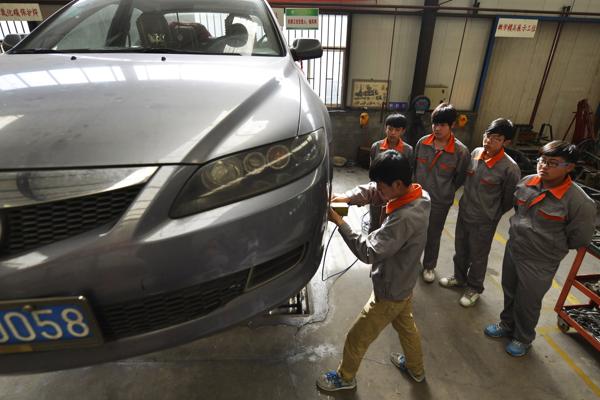
Students in a vocational school in Zouping county, Shandong province, learn vehicle maintenance and repair skills.[Photo by DONG NAIDE/CHINA DAILY]
Despite high employment rates and rising wages, workers lack respect.
Chinese vocational school graduates have been enjoying high employment rates and rising wages in recent years, but shortfalls in course enrollment still need to be addressed by giving more respect to these workers, a vocational education expert said.
“Optimizing the current economic structure is also needed to allow the workers to earn more and improve their standard of living,” said Chen Yu, vice-president of the China Association for Employment Promotion.
In an annual report on China’s higher vocational education in 2014, the employment rate of vocational college graduates reached 90.9 percent in 2013, increasing for two consecutive years and 1.3 percentage points higher than in 2011.
The report polled more than 90,000 graduates from more than 1,000 higher vocational colleges nationwide. The National Joint Conference of Vocational Technical College Presidents commissioned the Shanghai Academy of Educational Sciences and Beijing-based data firm My COS for the joint report.
The report said the starting salary of graduates from higher vocational schools in 2013 was about 2,940 yuan ($480) a month, up from 2,731 yuan in 2012 and 2,482 yuan in 2011.
According to a report from Guangming Daily, the average starting salary for graduates from universities and colleges in 2013 was about 3,378 yuan.
Still, the wage increase for vocational students has been higher than that for other employees in government and public institutes.
The latest report found that students who graduated from vocational schools in 2010 doubled their average monthly salary, reaching 4,640 yuan three years later.
“Our graduates still have better promotion prospects and larger growth in average salaries,” said Cen Yong, a senior official and teacher from a vocational school in Ningbo, in Zhejiang province.
Cen said that every year, more than 3,000 graduates from the college mainly find work in companies involved in logistics, foreign trade and languages, since such private companies thrive in the eastern coastal province.
The school has received a lot of positive feedback from companies on its graduates, she said.
Sixty percent of the vocational graduates were also promoted at least once in the past three years, the report said.
But increasing demand for technical workers has also resulted in a labor shortage of 22 million to 33 million, said Duan Dunhou, deputy president of the All China Federation of Trade Unions.
“In spite of the high employment rate and promising future for our graduates, it’s not easy to attract more students to the college,” said Cen from Ningbo, adding that her school enrolls about 3,000 students every year, a figure that has hardly changed in the past decade.
The shortage is more pronounced in vocational schools in western areas that are remote and less developed.
The government has been taking measures to narrow the gap and reform vocational education.
Premier Li Keqiang said in late February that the authorities will provide more investment and preferential policies to boost vocational education. More universities are also being encouraged to adopt vocational education in their systems.
“The main solution for attracting more young people into vocational schools lies in people’s perception of the workers,” said Chen Yu of the China Association for Employment Promotion.
Many people still think vocational studies are not good enough for their children and the salaries fall short of their expectations, he said.
“We have boosted our efforts to tackle such cases and will reward those who provide tips,” said a senior official from the Guangxi Frontier Inspection Department who declined to be named.
The official said that in many cities in Guangxi, such as Nanning and Liuzhou, frontier-inspection police have been conducting special operations that target criminals engaged in smuggling.
Meanwhile, border-frontier police are paying frequent visits to villages, train stations and ports to investigate suspicious people, and they have intensified supervision of private ships to prevent them from transporting criminals across the border, he said.
They have also deployed more officers in villages to prevent villagers from guiding criminals to Vietnam along footpaths, said Cui Min, news officer from the Liuzhou city frontier inspection department.
A number of Chinese citizens have recently crossed illegally into Vietnam by land and sea to engage in “smuggling drugs, trafficking wild animals, including pangolins and rhino horns, or precious woods to seek huge profits”, the official said.
The number of such cases has increased sharply since January, he said.
In a typical case in October, two traffickers were convicted of transporting people over the border illegally and sentenced to three years in prison. Four Xinjiang suspects were accused of illegally crossing the border and sentenced to 11 months by Guangxi Dongxing City People’s Court.
“Apart from initiating the special actions, police should widen the channels to collect clues,” said Li Lin, a lawyer who specializes in criminal cases, from Beijing Lawyers Society.
In addition, police in China should increase law enforcement cooperation with counterparts in Vietnam in terms of intelligence sharing and joint operations, she added.
